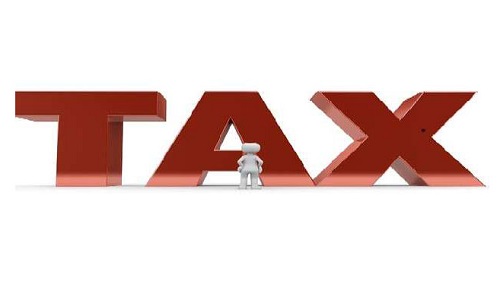Advance tax payment | Eligibility | Due date | Calculation

What is Advance tax?
Every assessee is required to pay income tax on his/her income exceeding the basic exemption limit. But, the tax required to be paid is ascertained only after the end of the year, so that the right amount of tax can be deposited on his/her actual income. This way, the government collects all the tax from the assessees, only after the end of the financial year, on or before the due date. However, the government earns no revenue in terms of taxes in between the financial year. Thus, the concept of ‘advance tax’ has been emerged to generate tax revenue to the government throughout the financial year.
This concept suggests that during the financial year, the eligible assessee shall pay tax in advance on estimated income, in specified instalments, on or before the due date of each specified instalment, instead of paying the lump sum amount at the year end.
In simple terms, advance tax means- ‘Pay as you earn’.
Who is eligible assesse for Advance Tax?
Ø Every assessee whose estimated tax liability for the year exceeds Rs. 10,000 is required to pay advance tax.
Ø However, senior citizens (60yrs or more), who are not in receipt of any income falling under the head ‘Profit from business and profession’ are exempt from this advance payment of tax.
Ø Further, the assessee opting for presumptive scheme of taxation under section 44AD and 44ADA are not required to pay advance tax at the required instalments. However, the whole amount of advance tax shall be paid on or before 15the March of every year. This relaxation has not been provided to assessees opting for presumptive scheme under section 44AE, i.e., they need to make advance tax payment like every other eligible assessee.
What are the due dates of payment of advance tax?
Earlier, i.e. upto FY 2015-16- there were different due dates for payment of advance tax for corporate and non- corporate assesses.
However, w.e.f, FY 2016-17, following shall be the due dates for all assesses:
Consequences for non payment of advance tax
Interest is payable under section 234A, 234B and 234C for violation of rules set for payment of advance tax.
v Interest u/s. 234A
This interest* is charged for late filing of Return of Income @ 1% per month or part of the month** from date immediately following the due date of filing of return, to the actual date of filing. (or till completion of assessment, where no return has been filed)
*Interest means Simple Interest
** part of the month example- 3months and 4 days shall be considered as 4 months.
Illustration:
The due date for filing the return of income of Mr. X is 31st July 2017. He filed his return of income on 3rd December 2017. Tax liability of Mr. X for the year is Rs. 30,000 (which is paid on 3rd December). Advance tax paid by him is Rs. 12,000 and he has TDS credit of Rs. 5,000. Will he be liable to pay interest under section 234A, if yes then how much?
Answer:
- Mr. X has filed his return of income after the due date i.e. after 31st July and hence, he will be liable to pay interest under section 234A.
- Interest will be levied at 1% per month or part of the month. The due date of filing the return of income is 31st July and the return of income is filed on 3rd December and hence, there is a delay of 4 months and 3 days. Part of the month i.e. 3 days will be considered as full month and hence, interest will be charged for a period of 5 months.
- Interest under section 234A will be levied at 1% per month on Rs. 13,000 (refer note below) for 5 months, i.e. Rs. 650 (13000*1%*5)
Note: The afore-mentioned interest shall be charged at assessed tax, as shown below:
| Particulars | Amount | |
| Amount of tax on estimated income | 30,000.00 | |
| Less | Advance tax paid (if) | 12,000.00 |
| Less | TDS deducted by others | 5,000.00 |
| Less | Self assessment tax (SAT)* | XXX |
| Assessed Tax | 13,000.00 |
*SAT shall be deducted if it is paid before the due date of filing return, even if the ROI has not been timely filed.
Note: In the above illustration, if the assessed tax liability on which interest was to be calculated was Rs. 13,489 then, while computing the amount liable to interest, any fraction of Rs. 100 is to be ignored and be rounded off to the nearest multiple of one hundred rupees, hence, we will ignore Rs. 89 and interest shall be computed on the balance amount of Rs. 13,400.
v Interest u/s. 234B
The advance tax is paid on estimation of income. Thus, the advance tax paid may differ from the tax liability ascertained at the year end on the actal amount of income.
In case the amount of tax paid in advance is less than 90% of the assessed tax, interest under this section is payable @ 1% per month or part of the month on the amount of shortfall in payment of advance tax from 1st April of the following financial year (or from 1st April of the relevant Assessment year) till the date of determination of income under section 143(1)(i.e. tax liability computed by the assessing officer), or where a regular assessment is made, till the date of such regular assessment.
Illustration:
Mr. Y is a businessman. His tax liability as determined under section 143(1) is Rs. 28,400. He has not paid any advance tax but there is a TDS credit of Rs. 10,000 in his account. He has paid the balance tax on 31st July i.e. at the time of filing the return of income. Will he be liable to pay interest under section 234B, if yes, then how much?
Answer:
- In this case, the tax liability (after allowing credit of TDS) of Mr. Y comes to Rs. 18,400 (i.e. Rs. 28,400 – Rs. 10,000) which exceeds Rs. 10,000 and hence, he will be liable to pay advance tax.
- He has not paid any advance tax and hence, he will be liable to pay interest under section 234B.
- Interest under section 234B will be levied at 1% per month or part of the month. In this case, Mr. Y has paid the outstanding tax on 31st July and hence, interest under section 234B will be levied for the period from 1st April to 31st July i.e. for 4 months, i.e. Rs. 736 (18400*1%*4)
v Interest u/s. 234C
This interest is charged @ 1% p.m. on failure of payment of specified percentage of instalment on or before the specified due dates. Interest under section 234C is levied for a period of 3 months in case of short fall in payment of 1st, 2nd and 3rd instalment and for 1 month, in case of short fall in payment of last instalment.
illustration:
Mr. Z is a businessman. His tax liability is Rs. 45,500. He has not opted for the presumptive scheme under section 44AD/ 44ADA.He has paid advance tax as follows:
Ø Rs. 8,000 on 15th June
Ø Rs. 11,000 on 15th September
Ø Rs. 12,000 on 15th December
Ø Rs. 14,500 on 15th March
Will he be liable to pay interest under section 234C, if yes, then how much?
Refund of Advance Tax
In case the amount of advance tax paid exceeds the actual tax liability, the assessee must get refund for the excess amount so paid. Generally, this refundable amount is reflected through ROI. But in special circumstances like:
The assessee eligible to get refund is no more. Thus his refund cannot be claimed through ROI.
In such a case Form-30 shall be filed by his/her legal representative claiming refund thereon.
Estimation of Capital gain or casual income
The amount of estimated income on which advance tax is paid is based on past years income. However, it is not possible to estimate any possible casual income (such as winning from lottery, etc.) or capital gain. Here, the normal provisions of advance tax do not apply.
In such cases, the penal interest u/s. 234C shall not be charged if the tax on such income is duly paid along with the next advance tax instalment or before 31st March (where no instalment is due).
Unilex is the leading income tax consultant for tax filing. With our experienced chartered accountants and advocates you can easily get your income tax filing and TDS returns and advance tax within 1 day at reasonable cost.
Recent posts

U
Unilex
U
Unilex
U
Unilex
U
Unilex
U
Unilex








 “I have registered my PVT LTD company and Trade MARK through UNILEX, had a smooth process and also their price are very reasonable across the industry.
Great Work Guys.......”
“I have registered my PVT LTD company and Trade MARK through UNILEX, had a smooth process and also their price are very reasonable across the industry.
Great Work Guys.......”
Your comment